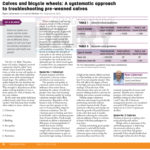Calfhood Diarrhea: Two Different Causes = Two Different Electrolyte Strategies
Click here to view as a pdf: Calfhood Diarrhea Two Causes Two Electrolyte Strategies
Click here to watch as a video: https://youtu.be/fUI2G9xB41U
Calf scours are an economically devastating disease affecting calf raisers, primarily because scours cause calves to rapidly dehydrate. Providing proper hydration can help shorten the severity and duration of calf scours. Electrolyte therapy should be paired with a prevention plan to address the cause of the scours. Choosing the right electrolyte for the job at hand can be confusing. Crystal Creek® is here to help.
Regardless of the type or cause of calf scours, Crystal Creek® has an effective, economical electrolyte that is right for your operation. For more information, contact Crystal Creek® or your local Crystal Creek® dealer. We’d be happy to discuss how our calf products will help you raise healthier, more profitable calves.






